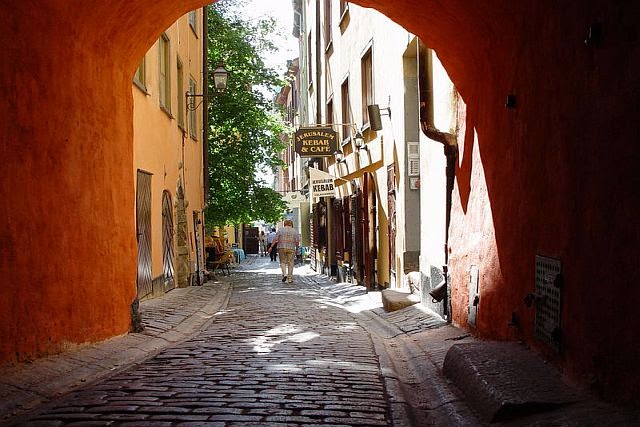 |
| Stockholm, Sweden blends the best of the old with the best of the new (wikipedia) |
With the growth of international air
service, off-season travel is becoming increasingly popular and, believe it or
not, Sweden
has much to offer during the winter.
 |
| Nobel Banquet setting in 2006 (wikipedia) |
December 10th is the day when Stockholm is abuzz with
activity for the awarding of the Nobel Prizes. All except for the Peace Prize,
that is, which is presented annually in Oslo ,
Norway
For the first 29 years of the Nobel
ceremonies the banquet took place in the Hall of Mirrors at the Grand Hotel in Stockholm . Despite several
changes in venue for the banquet over the past century, Hotel Grand still
serves as the official headquarters and residence for the prize winners.
 |
| Grand Hotel, Home of the Nobel Prize winners (wikimedia) |
Each Nobel Banquet has
a theme which is represented by the decorations and the entertainment during
the evening’s festivities. Some 23,000 flowers consisting of lilies, orchids,
gladioli and roses, are grown especially for the occasion and flown in from the
Italian Riviera in San Remo
As one might expect,
the menus for the festivities are a highlight, but the selection process is
almost as revered as the Nobel prizes themselves. Three chefs with
international credentials are selected to compete by submitting menus for
tasting and testing each September.
There is more to the
process than simply designing a culinary feast for the Nobel laureates however.
Though distinctly Scandinavian, the menus must be designed to accommodate the
various cultural and religious considerations of the select guests at the
banquet.
Once chosen, the menu
remains a secret until the actual day of the feast.
 |
| Stockholm Town Hall, site of the Nobel banquet (wiklpedia) |
But here is the hook
for traveler’s visiting Stockholm
With a little advance
notice, Stockholm
MENU
Saumon fumé aux épinards
Œuf poché

Filet de renne aux chanterelles
Sauce Akvavit, pommes lyonnaise
Salade et gelée

Parfait Glace Nobel
Petits fours
Œuf poché
Filet de renne aux chanterelles
Sauce Akvavit, pommes lyonnaise
Salade et gelée
Parfait Glace Nobel
Petits fours
VINS
G. H. Mumm Cordon Rouge, Brut
Château Landreau 1976
Eau minérale Ramlösa
Café
G. H. Mumm Cordon Rouge, Brut
Château Landreau 1976
Eau minérale Ramlösa
Café
BUFFET
Long John Whisky
Bols Silver Top Dry Gin
Campari
Long John Whisky
Bols Silver Top Dry Gin
Campari
Visitors who participate in this rare dining experience receive a
certificate featuring their names and the designation of the Nobel menu they
selected.
 |
| Traditional Lucia procession in Sweden (wikipedia) |
Another tradition which has been observed throughout the years in Sweden and Norway
At the same time, everyone sings a familiar traditional melody from Naples , Italy St. Lucia
A second metaphorical meaning of the candles is highlighted by Santa
Lucia’s victory over darkness.
In the early 19th century it became a Swedish tradition for
the oldest daughter to awaken her parents on the morning of the Lucia with
coffee and St. Lucia
 |
| Old Town (Gamla Stan), Stockholm, Sweden (wikipedia) |
Today many cities throughout Scandinavia
elect an official Lucia for the community and then have a public procession to
honor the maids. Though not an official holiday, the tradition began in 1927 in
Stockholm
Over the decades the Lucia has become a favorite
occasion. Many universities hold large formal dinner parties for students to
celebrate together before returning to their families for Christmas.
 |
| St. Lucy's Day or the Lucia as celebrated in Sweden (wikipedia) |
In many ways the Lucia represents a simpler time as a celebration of the
re-birth of light. It is not difficult to see why such an event would become so
popular during the Christmas season in a land where the short days of winter
are filled with darkness.
The experiences of a sumptuous banquet and the moving local tradition of
the Lucia are truly a Nobel Prize for travelers to Sweden







0 comments:
Post a Comment